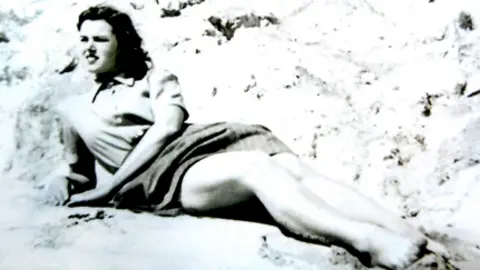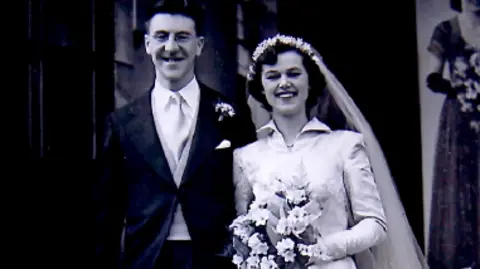The glamorous Guernsey evacuee who settled in Scotland
 David Hunter
David HunterIt was dawn on 9 May 1945 when HMS Bulldog arrived at Guernsey Harbour, signalling the end of five years of Nazi occupation of the Channel Islands.
The islanders who gathered on the quayside were malnourished but jubilant. Liberation Day – as it became known – marked the end of the war but also meant the return of the island's children.
Half the population, including almost all of the children on the island, had been sent away five years earlier in June 1940.
Eighty years on from the Liberation of the Channel Islands, a Glasgow family will remember the story of one child evacuee who loved Scotland so much, she stayed.
Thirteen-year-old Elvira Le Page was one of the 5,000 children gathered in their schools when evacuations on the island began.
Her son, David Hunter told BBC Scotland News: "They had no idea where they were going or for how long.
"They were only allowed to bring a small amount of things, a pillowcase worth of clothes and a toy, and they waited in the school for the boats to arrive."
The evacuation of thousands of Allied troops from Dunkirk in the weeks before meant the Channel Islands were at serious risk of invasion by the Nazis because of their strategic importance as a stepping stone to England.
Like Dunkirk, the operation relied on what was available - so the ships weren't designed for passengers and the journey was uncomfortable and dangerous thanks to the presence of German U-boats in the Channel.
In Weymouth, they were taken to reception centres - operated by charities like the Red Cross - where they were lined up, given health checks, labels and a small amount of food before they boarded trains with blacked-out windows.
Some of the children were with older siblings or parents, but Elvira travelled with her school class and teacher. No one knew where they were headed.
Evacuees were sent to Bury, Oldham, Wigan, Halifax and Manchester but the largest numbers went to Stockport and Glasgow, and that's where Elvira arrived two days later.
There, the 1,300 arrivals were divided between a number of church halls in the southside of Glasgow. For Elvira it was St Ninian's in Pollokshields.
 David Hunter
David HunterAlthough work had begun to find households willing to accommodate children and their carers, it took some time to happen.
David said: "Their teachers continued with lessons but really they had to act as mothers and fathers to children who'd never been away from home before, and found themselves sleeping each night in dormitories in church halls in strange cities."
For Elvira, the offer of a new home arrived in the form of Dr Douglas Clutterbuck and his wife Effie. She was one of three girls to share their home in Newton Mearns on the outskirts of Glasgow.
"They had a privileged life and mum got to follow that," he continued.
"During the war, they had bombers fly over here and they had an air raid shelter in the garden which they sometimes had to go into - but they had a really nice lifestyle and treated mum really well."
Elvira, who'd blossomed into a 19-year-old woman by the time the war ended, was treated so well that she didn't really want to return home. When she eventually did, she was keen to make an impression.
"She was so glamorous and told us she made a real effort when she went back but she was sick as a dog on the boat on the way over so she didn't make the impression she wanted to," David added.
'An urban girl'
Life had also changed in Guernsey. Elvira's mother died when she was a toddler, her father during the war, and her 12 siblings had their own lives to lead.
Most of the evacuees returned to Guernsey. A handful choose Scotland as home, including Elvira.
David said: "She always said there just wasn't anything for her there. Most of the children went back because they had families to go back to.
"Mum had changed dramatically and was no longer interested in the rural lifestyle. She's an urban girl who loved the tennis club and the friends she met there."
One friend in particular interested Elvira - Jack Hunter whose best friend lived next door to the Clutterbucks.
He and Elvira married a few years later, with Effie Clutterbuck as guest of honour at their wedding.
They had two sons – David and his brother Douglas – who they raised in Scotland.
She returned to Guernsey with her new family many years later - this time, less windswept and seasick.
Since her death in 2007, David has been keen to explore his family connections with the island his mother left behind.
He said: "I feel a huge belonging to Guernsey. It's why I've gone back on so many occasions and take my own family."
He and his family joined the events being staged to mark the 80th anniversary of Liberation Day.
